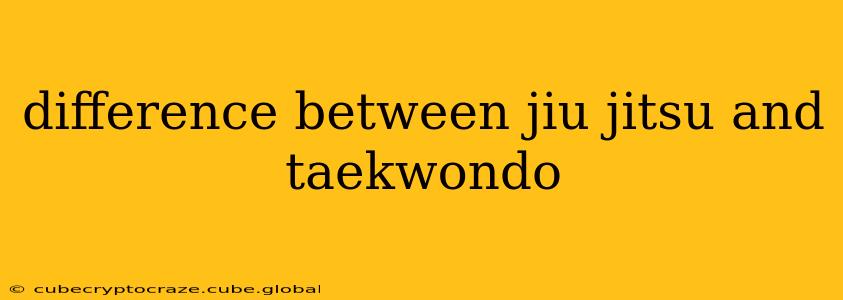Martial arts offer a diverse range of disciplines, each with unique strengths and philosophies. Jiu-Jitsu and Taekwondo, while both effective fighting styles, differ significantly in their approach to combat and the skills they emphasize. Understanding these differences is key to choosing the right martial art for your goals and preferences.
What is Jiu-Jitsu?
Jiu-Jitsu, particularly Brazilian Jiu-Jitsu (BJJ), focuses on grappling and ground fighting. It emphasizes taking the fight to the ground, using leverage, technique, and submissions to subdue an opponent. Strikes are generally not a significant part of BJJ training, though some schools may incorporate them. The core principles revolve around using an opponent's weight and momentum against them, achieving superior position, and securing a submission hold (choke, joint lock, etc.).
What is Taekwondo?
Taekwondo is a Korean martial art characterized by its dynamic and powerful kicking techniques. It prioritizes speed, precision, and power in strikes, particularly kicks, delivered from a variety of stances and distances. While Taekwondo does include some self-defense grappling and blocking techniques, its emphasis is firmly on striking. It's often characterized by its spectacular high kicks and spinning techniques.
Key Differences Between Jiu-Jitsu and Taekwondo
Here's a breakdown of the core distinctions between these two martial arts:
Combat Style:
- Jiu-Jitsu: Primarily grappling and ground fighting; focuses on submissions.
- Taekwondo: Primarily striking; focuses on powerful kicks and punches.
Emphasis:
- Jiu-Jitsu: Leverage, technique, ground control, submissions.
- Taekwondo: Speed, power, precision, kicking techniques.
Distance Fighting:
- Jiu-Jitsu: Close-range combat; often involves clinching and grappling.
- Taekwondo: Mid-to-long-range combat; utilizes powerful kicks from a distance.
Self-Defense Applications:
- Jiu-Jitsu: Highly effective in close-quarters combat situations, especially against larger, stronger opponents. Excellent for defending against takedowns and controlling an opponent on the ground.
- Taekwondo: Effective for self-defense at a distance, particularly against multiple opponents. The powerful kicks can create distance and deter attackers.
Fitness Benefits:
- Jiu-Jitsu: Improves strength, flexibility, cardiovascular health, and mental toughness through intense grappling and sparring sessions.
- Taekwondo: Improves cardiovascular fitness, leg strength, flexibility, and coordination through dynamic kicking drills and sparring.
What is better for self-defense?
The "better" martial art for self-defense depends entirely on the specific situation and individual preferences. Jiu-Jitsu excels in close-quarters combat and ground fighting scenarios, while Taekwondo is advantageous when facing multiple opponents or maintaining distance. A blended approach, incorporating elements of both disciplines, could provide a well-rounded self-defense system.
Which one is better for fitness?
Both Jiu-Jitsu and Taekwondo provide excellent fitness benefits. Jiu-Jitsu tends to build more overall strength and muscular endurance, while Taekwondo emphasizes cardiovascular health and leg strength. The best choice depends on your fitness goals and personal preference.
Which martial art is more effective?
The effectiveness of any martial art depends on the skill and experience of the practitioner. Both Jiu-Jitsu and Taekwondo can be highly effective fighting styles in the right hands. The "better" art is subjective and hinges on the specific context of the fight and individual capabilities.
Can I learn both Jiu-Jitsu and Taekwondo?
Absolutely! Many martial artists cross-train in different disciplines to enhance their skills and gain a more well-rounded understanding of combat. Combining Jiu-Jitsu and Taekwondo could provide a highly effective and versatile self-defense system.
In conclusion, the choice between Jiu-Jitsu and Taekwondo depends heavily on your individual goals, physical preferences, and desired learning outcomes. Both are valuable martial arts with unique strengths that can benefit individuals in different ways.
